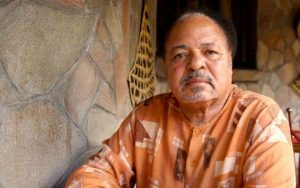ABOUT US
The Sapes Trust has over the last 20 years of its existence been at the cutting edge of research and policy studies in the field of regional cooperation and integration in Africa, with special reference to Southern Africa. As such, the Sapes Trust Library and Documentation is also one of the main – if not also the largest – depository of material on the origins and development of SADCC/SADC; the history of liberation movements in Southern Africa; and the Pan Africa Movement. Sapes Trust (through Ibbo Mandaza) was one of the resource bases for the production of the History of SADC; On Hamonisation, Rationalisation and Coordination of the activities of the PTA and SADC and Ibbo Mandaza, Chinyamata Chipeta and Gilbert Mudenda – all founders and Trustees of the Sapes Trust – were commissioned (as researchers of Sapes Trust) to undertake the study, Masters in Policy Studies, which sought to reconcile SADC and the PTA/COMESA. It is the same study that is currently assisting the current efforts towards developing a more integrated approach towards the Africa Union. Both the concept of Sapes Trust as a Pan-African, regional network of scholars and activists, and the research and policy studies programme of the organization, constitute a veritable experiment in regional cooperation and integration. For example, the Masters in Policy Studies Programme (MPS), through which some 9 groups of 45 students each have graduated over the last decade, brings together faculty members and policy studies practitioners from across Southern Africa, East Africa and West Africa. Indeed, the MPS, as well as the Sapes Research Programme, are the bases upon which Pan Afrika is to be established and developed as the centre for promoting regional integration in Africa.
TRUSTEES
 Ibbo Mandaza is a Zimbabwean academic, author and publisher. He holds a Doctorate of Philosophy (D.Phil) in Political Economy from the University of York in England (1979) and taught at the Universities of Botswana, Zambia, Dar re Salaam and Zimbabwe (part-time). He has researched and written extensively on issues of governance, international relations and public policy; and was one of the first senior African Civil Servants in post-independent Zimbabwe (1980-1990), having been a member of the (Zimbabwe) National Liberation Movement, in the Department of Research, Education and Manpower, ZANU Headquarters, Maputo, Mozambique. He served as Director of the National Manpower Survey and Permanent Secretary in the Ministry of Manpower Planning and Development; as Deputy Chairman of the Public Service Commission and Member of the Defence Forces Commission; and finally as Chairman of the Parastatals Commission, before his early retirement from the Civil Service in July 1990 at the age of 42.
Ibbo Mandaza was Chairman of the Board of Directors of the second largest tourism and hotel group (Rainbow Tourism Group) in Zimbabwe from 1992 to 2009
Ibbo Mandaza is currently Executive Chairman of the Southern African Political Economy Series (SAPES) Trust, a regional Think Tank and Convenor of the Policy Dialogue Forum.
Ibbo Mandaza is a Zimbabwean academic, author and publisher. He holds a Doctorate of Philosophy (D.Phil) in Political Economy from the University of York in England (1979) and taught at the Universities of Botswana, Zambia, Dar re Salaam and Zimbabwe (part-time). He has researched and written extensively on issues of governance, international relations and public policy; and was one of the first senior African Civil Servants in post-independent Zimbabwe (1980-1990), having been a member of the (Zimbabwe) National Liberation Movement, in the Department of Research, Education and Manpower, ZANU Headquarters, Maputo, Mozambique. He served as Director of the National Manpower Survey and Permanent Secretary in the Ministry of Manpower Planning and Development; as Deputy Chairman of the Public Service Commission and Member of the Defence Forces Commission; and finally as Chairman of the Parastatals Commission, before his early retirement from the Civil Service in July 1990 at the age of 42.
Ibbo Mandaza was Chairman of the Board of Directors of the second largest tourism and hotel group (Rainbow Tourism Group) in Zimbabwe from 1992 to 2009
Ibbo Mandaza is currently Executive Chairman of the Southern African Political Economy Series (SAPES) Trust, a regional Think Tank and Convenor of the Policy Dialogue Forum.
Dr. Gilbert Mudenda was born in November 1949 at Macha Mission Hospital in Choma District, Zambia. He started school in 1956 and went to upper primary in 1959. He later on attended secondary school at Choma Secondary School in 1964. Dr. Mudenda went for training as a tax inspector in Ndola at what has now become ZRA (Zambia Revenue Authority) and later on qualified to enroll at the University of Zambia (UNZA). After finishing university, he was posted to Namwala Secondary School where he taught as a young teacher for two and half years.He also taught at the University of Zambia in the department of Development Studiesin 1978 for two and half years. Dr Mudenda finished his doctorate in 1984 and left for Zimbabwe to start SAPES Trust in 1987, a regional organisation doing social science research, publishing, organising seminars and workshops.
Professor Chinyamata Chipeta was born on August 30 1939 in Ndembela village, Rumphi District in Malawi. He is the Executive Director of the Southern African Institute for Economic Research and was formerly a professor of Economics at Chancellor College, University of Malawi. He did his undergraduate study at Makerere College in Kampala, Uganda (Bsc Econ: First Class Honours) in 1967. He attained his M.A in 1973 and his Ph.D in 1976 at Yale University and Washington University respectively.
He was an Administrative Officer at the Ministry of Finance in the Government of Malawi in 1965, and was a Lecturer from 1967 to 1982. He later on became a professor of Economics from 1984-1995. Other work Experience include: Contributor in the Economist Intelligence Unit, Director and Chairman of various well established organizations.